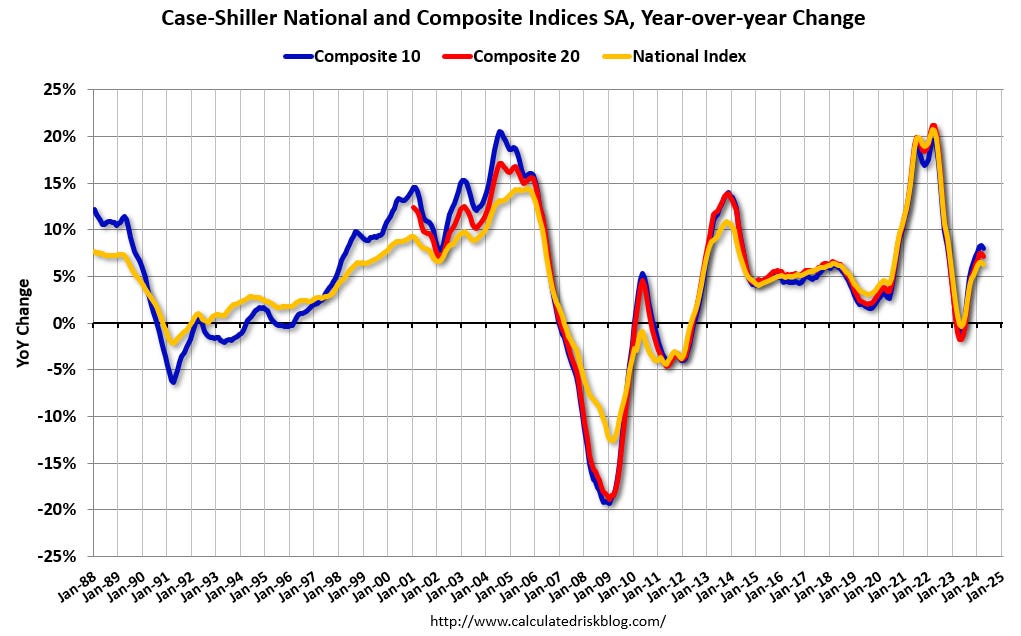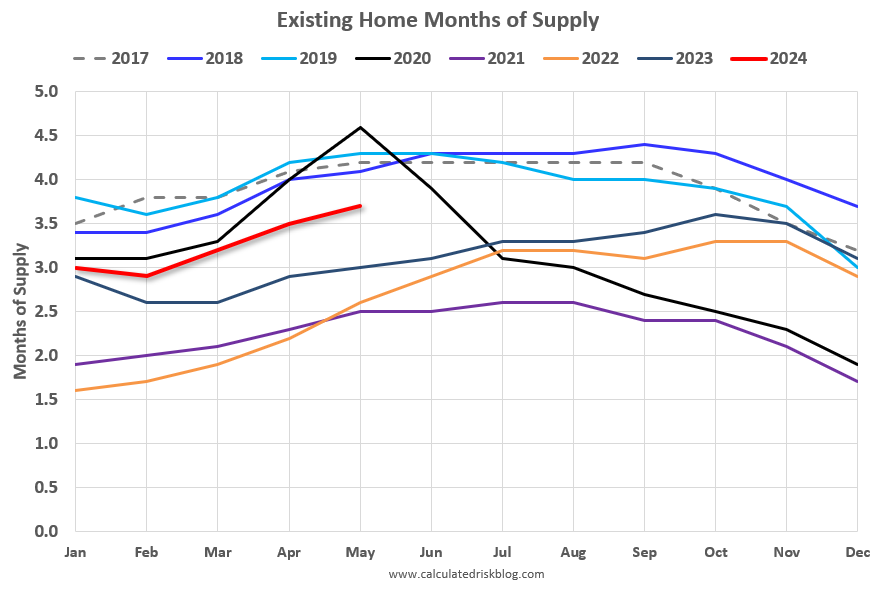We will review and consider revising our current DEI goals while still ensuring a respectful environment. [Diversity, Equity, Inclusion]
Withdraw our data on emissions and focus on our land and water conservation efforts. [ESG=Environmental, Social, Governance]
Friday, June 28, 2024
Tractor Supply Ditches DEI, ESG After Online Attacks
Wednesday, June 26, 2024
Higher interest rates in the US strengthen $ (or depreciate ¥)
- Investors earning 1% in Japan liquidate their investments, sell ¥ to buy $ to invest in the US where they can earn 5%; or
- Carry Trade: Investor's borrow in Japan, sell ¥ and buy $ to invest in the US and earn money on the spread between the cost of borrowing (1%) in ¥ and what they earn on $ investments (5%).
Tuesday, June 25, 2024
Why are house prices increasing?
It is likely that high mortgage rates are causing existing homeowners with low interest rate (3%) mortgages to stay in their current homes rather than buy new houses which would require taking out new mortgages at 7%. This means that the supply of homes for sale is very low which drives up the price.
Note that the supply of homes is usually measured by "months of inventory" which is calculated by asking "at the current rate of sales, how many months would it take to sell all the houses currently for sale?" In the graph below, we see a negative relationship between months of inventory and the change in house prices. When months of inventory is below 6 months, prices are likely to increase, and vice-versa.
Currently there are four months of supply in the US. But market definition matters here. Most real estate markets are local, so it would be best to measure months of supply locally.
Wednesday, June 19, 2024
Vertical Integration in Movie Distribution
A new paper, "Vertical Integration and Market Foreclosure in Media Markets: Evidence from the Chinese Motion Picture Industry," by Gil et al. casts even further doubt on vertical foreclosure strategies. The claim is that a retailer integrated with a producer could increase profits by disadvantaging independent producers. Alternatively, vertical integration could alleviate double marginalization issues so that profits increase by offering lower prices to more consumers. In the US, the Paramount decision required movie studios to divest their movie theaters based on the possible competitive harm from vertical foreclosure. But China still has both integrated and independent theaters.
... there is no evidence consistent with anticompetitive input and customer foreclosure in integrated theaters. On the one hand, integrated and independent theaters screen the same share of integrated and independent movies. On the other hand, revenue differences between continued theater-owned movies and discontinued independent movies are inconsistent with customer-market-foreclosure motives given existing differences in distribution incentives between integrated and nonintegrated structures.
The authors go on to estimate that integrated theaters deliver a higher level of utility with integrated movies due to moving down the demand curve with lower prices.
This finding is important to current events in antitrust policy for two reasons. Part of the FTC's current Amazon case, as with its other enforcement vertical actions, alleges foreclose of independent merchants. Movie distribution was the poster child for this theory. More broadly, it underscores the power of a consumer surplus standard. Why interpret the law so severely that it harms consumers?
Tuesday, June 18, 2024
More rent hikes coming?
The least affordable home-sales market in decades is compelling more renters to stay put. Large apartment owners say fewer renters are moving out to buy homes than ever before, put off by record home prices, limited inventory and higher mortgage rates.
Competition comes to Private Credit
From The Economist:
The history of leveraged finance—the business of lending to risky, indebted companies—is best told in three acts. High-yield (or “junk”) bonds were the subject of the first. That ended in 1990 when Michael Milken, the godfather of this sort of debt, was sent to prison for fraud. In the second act, the extraordinary growth of private equity was financed by both junk bonds and leveraged loans, which require companies to pay a floating rate of interest rather than the fixed coupons on most bonds. Private-credit investors are now supplying the third wave of money. Since 2020 such firms, which often also run private-equity funds, have raised more than $1trn. ...
America’s $4trn leveraged-finance market now comprises junk bonds, leveraged loans and assets managed by private-credit firms, in roughly equal proportions. Yet owing to fierce competition to refinance debt and fund scarce new deals, private credit’s prospects may no longer dazzle. ...
As high interest rates put balance-sheets under pressure, for example, borrowers of private loans are increasingly negotiating to defer their interest payments. But healthier firms can afford to shop around. ... borrowers securing coupons that are 1.6 percentage points lower on average. Private lenders have had to slash the cost of their loans to compete. ...
the most likely outcome is that the line separating public and private loans will become increasingly blurred. That would mean a busy future for private credit—but one that is more commoditised and less profitable.
Tuesday, June 11, 2024
China's anti-growth policy
...China’s stockmarkets began falling in the second half of 2023, then plunged in early 2024 (see chart).
This led to regulatory scrutiny of new IPO's
...On top of on-site inspections, regulators now review companies’ past business deals and trawl through executives’ bank accounts, according to Reuters, a news agency. Faced with this, at least 80 companies withdrew their ipo applications in the first quarter of 2024.
When IPO exits are harder, fewer VC's want to invest:
...Just five Chinese companies listed on domestic bourses in April, down from 35 in April 2023. The ipo market raised 80% less capital in the first four months of 2024 than in the same period the previous year.
RIP James Lawson
- The protests forced a reckoning, and Nashville became the first Southern city to desegregate its downtown lunch counters in 1960.
- Vanderbilt expelled Lawson in 1960 due to his leadership role in the sit-ins. Lawson later reconciled with Vanderbilt, and the university created an institute in his honor.
Sunday, June 9, 2024
Price controls deter voluntary, wealth-creating transactions: CA minimum wages increase to $20/hour
When staking out a position, it is rare for a politician to acknowledge any tradeoffs. For example, a politician in favor of a minimum wage increase will praise the increased wages for workers, but won't acknowledge that businesses will shut down or fire workers. That job is left to those on the other wide of the issue:
Nearly 10,000 California fast food workers have been firedthanks to the state's new $20 minimum wage, according to the California Business and Industrial Alliance (CABIA), which slammed Governor Gavin Newsom for the law which went into effect April 1.Source: ZeroHedge
Saturday, June 8, 2024
Why organizations commit less visible errors or why Anthony Fauci didn't test
Wednesday, June 5, 2024
When life imitates comedy: FTC's Amazon Flip Flop
On one hand, booksellers argue that Amazon uses its clout to obtain and sell books at lower prices, forcing them to cut their own prices [Chair Khan's former position]. On the other, the FTC says Amazon uses its market power to block other businesses from selling at lower prices [Basis of FTC's current position]. (WSJ)
When an Agency with enormous prosecutorial discretion abandons principle, it loses credibility:
The progressive antitrust movement that Khan leads is ideologically incoherent. Progressives believe that the government should break up Amazon simply because it is a big company and will say or do anything to reach their desired goal. The FTC’s and ABA’s arguments, while contradictory, both amount to the legal equivalent of flinging spaghetti at the wall and seeing what sticks. (Nat'l Rev)There is also a rumor that the FTC might be offering VERA-VSIP (early retirement with an incentive payment), perhaps to rid themselves of the remaining staffers who still care about principle, i.e., protecting competition.
Monday, June 3, 2024
Costco's Price Discrimination
There is a great episode of the Acquired podcast about the Costco business model. It is three hours long and full of history, anecdotes, and, importantly, lots of business insights. One is just how important two-part pricing is to their business model. Customer/members pay an annual membership fees to pay much lower prices. Costco limits product markups to 14% when the standard for traditional retailers is 100%. This means that 70% of the net income is from memberships and only 30% is from retailing. Another is how scale economies feature throughout their operations, from pallets on the floor to the Kirkland Signature brand. Their low margins and scale economies are meant to deliver huge consumer surpluses that they then extract with the membership fee.
Sunday, June 2, 2024
Migrants Bear Costs of Biden's Changing Immigration Policy
But instead of landing closer to the U.S. border, they are being hauled roughly 1,000 miles in the opposite direction — deep into southern Mexico in a shadowy program meant to appease the Biden administration and ship migrants far from the United States.
Mexican authorities rarely publicly acknowledge the busing program, making it much less contentious than the efforts by Republican governors to transport migrants to blue states that have become political theater in the United States.BOTTOM LINE:
In the first four months of 2024, U.S. border apprehensions plunged in one of the steepest declines in decades, giving the Biden administration some relief as immigration persists as a top voter concern in this year’s election.HT: Chris






